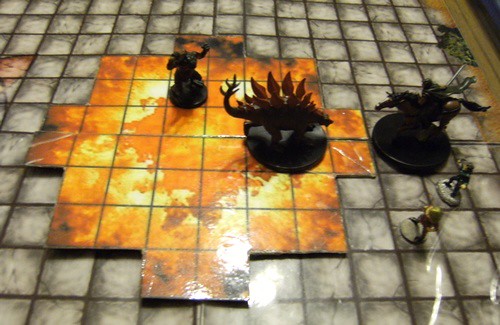Here you'll find opinions, musings, and mutterings from a gamer and a gentleman. I raid in a suit, bring scotch to LAN parties, and stand opposed to the general douchebaggery exhibited by other gamers.

Monday, June 20, 2011
Out Of Control-ler
My wife joined our D&D game recently to get some dice-slinging in over the summer break. She wanted to play something a bit different, so she made a melee-focused valorous bard. She prefers to stay at range and decided to go ahead and try a front-line leader to help out the party, which is a little ranged-heavy.
Last week's game took the intrepid members of the Unsung (and their new bard friend) into some cramped quarters: they were investigating the disappearance of several children from a local merchant caravan, which they tracked to a rundown soap-making plant in the seedy part of town. It was also rumored to be the center of the local kingpin's drug operation, which the players confirmed once they were inside and fighting their way through the Soapworks' lower levels.
But those cramped quarters wound up putting her at odds with another member of the party who just couldn't resist the opportunity to do some damage.
Friendly Fire
The problems started once they got into the dungeon underneath the Soapworks proper. The alchemist who ran the facility also used it to experiment on addicts, the homeless and others who could disappear from the local streets and never be missed. Once the players started combat these wretches started flailing and moaning at the bars, potentially grabbing anyone who got too close and ended their turn adjacent to the cells. So my wife and the paladin were mixing it up in the middle of the room with Doctor Krum, a massive ogre with a sick and twisted intelligence, and his "lab rats", malformed guards who had been augmented by the Doctor's concoctions.
The target-rich environment was just the kind of thing our wizard craved: lots of enemies clustered together for him to blow up with all his burst-y spells. The problem was that the bard and paladin were also in the thick of things, with the paladin holding Doctor Krum's attention and the bard trying to give buffs where possible. Not wanting to kill the party's tank, the wizard adjusted his aim... and dropped the spells on the bard so he could catch more targets.
As my wife's bard started dropping to bloodied and past, she started making some comments to try and clue this guy she'd only gamed with twice before into the fact that she was dying, and he was part of the reason why.
"Hey," she said, "I'm going to have to use these heals on myself if I keep getting hit like this."
The wizard shrugged. "You can move out of melee," he said while planning his next Scorching Burst.
She blinked. "I'm a melee bard," she countered, "I need to be in melee to do my job."
The wizard seemed not to notice. A few rounds later when one of the Doctor's lackeys broke loose and plowed into the frail caster, he nudged an elbow in her direction.
"Hey, I'm down to four hit points by the way."
She shrugged. "I'm out of healing powers," she said, "I had to use them on myself."
That seemed to get his attention, and his next fireball landed just shy of her position.
You Must Learn Control
These are symptoms of a problem common to several D&D players, not just those who play controllers. The desire to put out big numbers and be in the spotlight can be very overwhelming, and lead some to throw caution to the wind (especially when it involves other players' characters).
In 4E D&D, character roles have their strengths and weaknesses, and each has a built-in challenge they have to deal with. Most players try to minimize or even ignore the weaknesses of their class in order to maximize their effectiveness (and by effectiveness I mean the amount of damage dealt): this is where the term "min-maxer" comes from. Issues with min-maxing show up when minimizing those weaknesses comes at the expense of the party as a whole, such as when a controller with lots of AOE spells starts flinging them about regardless of his fellow party members' hit points, or a defender builds a character entirely based on dealing large amounts of damage instead of soaking large amounts of damage.
The reason wizards and other blast- and burst-happy classes were called "controllers" is because that's what they offer, but that's also what they require. A well-played controller can shape a battlefield or an opposing force like a sculptor shapes clay, while a poorly-played controller hits it with a fireball until it's an ashtray.
Postmortem
On the ride home from the game, my wife said she'd had fun despite being annoyed at the controller's tactics. I offered to talk to the wizard before the next game, but she said she didn't want to rock the boat since she was new to the group. Hopefully with a few less healing spells going his way, the wizard will catch on and decide to put a little more control into his game.
Subscribe to:
Post Comments (Atom)



Sounds like a controller too used to hitting a pet that took reduced damage :).
ReplyDelete